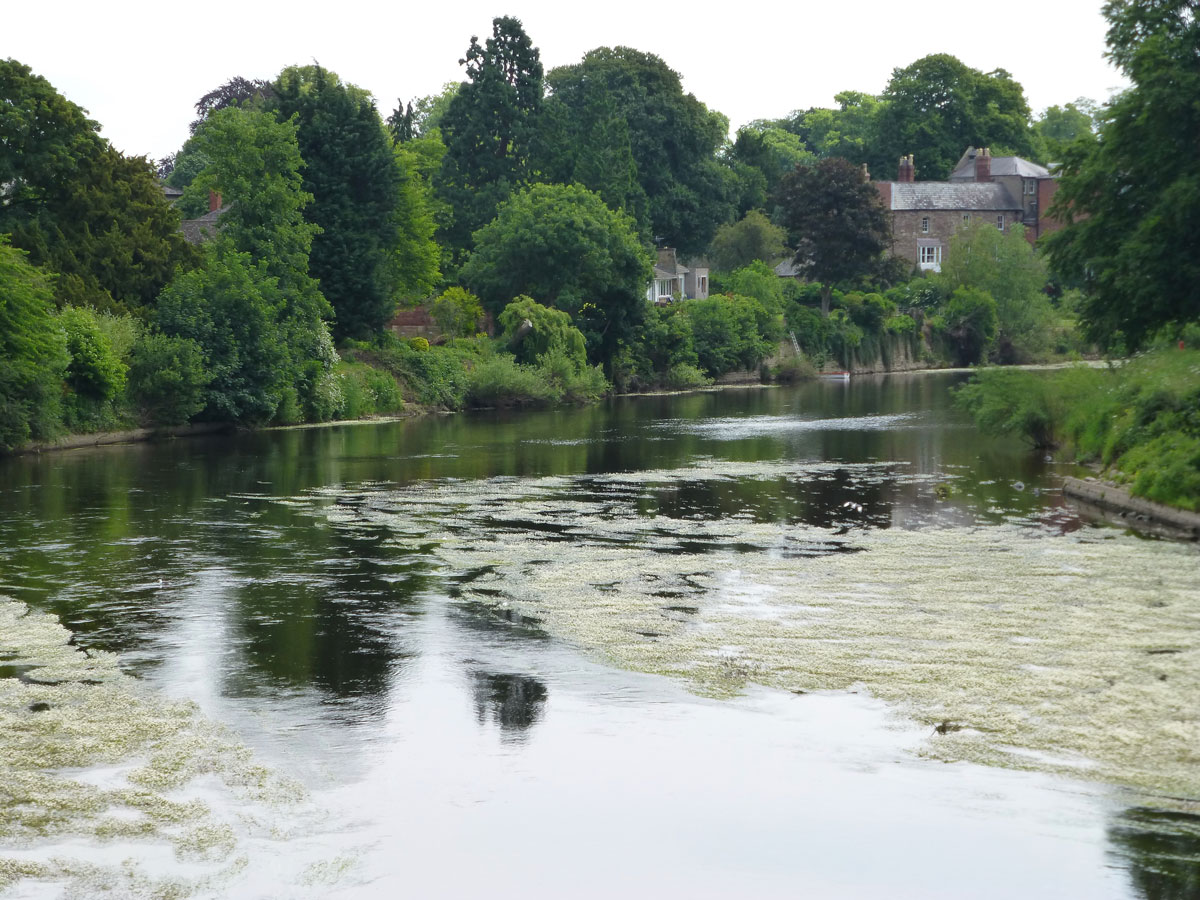Claims against Avara Foods and Environment Agency for damage caused to the Wye
Published on : 19 Mar 2024

Flowering ranunculus weed bed (credit Phil Wilson)
Legal action is being taken against the poultry industry operating in the River Wye catchment, seeking compensation on behalf of people living nearby. A separate claim against the Environment Agency for the authority's failure to properly enforce the rules to protect the Wye from agricultural run-off was heard in the High Court in February 2024. In a press release issued by law firm Leigh Day, a claim 'potentially worth hundreds of millions of pounds' was launched against Avara Foods, the poultry meat giant that controls 80% of the chicken farming in the region. At a recent event in Monmouth organised by River Action, Avara Foods presented their plans to export three-quarters of the poultry litter produced by their network out of the catchment, operating a track and trace system in partnership with Gamber Logistics to ensure responsible use elsewhere in the country, either as fuel for bioenergy or fertiliser. The remaining quarter was to remain in the catchment, where a soil or crop need could be demonstrated. Although this action is acknowledged as a step in the right direction, Leigh Day alleges that compensation is due for the damage already caused. Natural England downgraded the River Wye to "unfavourable - declining" status, and the claim representing householders, businesses and the community in the 4000 sq km catchment across Powys, Herefordshire and Monmouthshire states that property values and revenues, as well as biodiversity and amenity access, have been impacted. Avara Foods is a UK subsidiary of US multinational Cargill Plc, which has faced similar claims in the US caused by polluting the Illinois River due to the same practice of high intensive poultry farming. In 2023, the Oklahoma Court ruled that Cargill Inc. polluted the Illinois River by spreading chicken manure on land so it leached into the river's watercourse. The judge, in that case, found that Cargill knew or should have known that using poultry waste as fertiliser posed a risk to waterways, and the UK claimants will similarly allege that Cargill Plc and Avara Foods knew that the outcome of intensive poultry farming would cause the pollution of the River Wye but continued with their operations anyway. Avara Foods says it is committed to playing its part in restoring the River Wye "by taking accountability for the poultry manure that originates from its supply chain... but reversing the decline of the river is beyond the means of any single organisation". Leigh Day partner Oliver Holland said: "We consider that the significant decline in the health of the River Wye over the last few years is clearly linked to the significant increase in intensive poultry farming in the main brought about by Avara Foods. The lives and livelihoods of those living in the River Wye area are being significantly impacted only to the benefit of Avara Foods, a subsidiary of US multinational Cargill Plc. This destruction of one the UK's most beautiful natural areas cannot continue, which is why we are bringing this legal action."
(credit Phil Wilson)
Asked whether or not other farmers, such as arable, dairy or egg producers, may face future legal action, Leigh Day offered: "We are at a relatively early stage of our investigations, and we are investigating other actors in the region who may be responsible for contributing to the environmental degradation of the River Wye." For now at least, the free-range farmer or packer may not be in the direct line of fire. Nonetheless, is there more the egg industry ought to be doing? What actions can farmers and industry regulators take to protect against environmental and reputational damage? BFREPA Council and board member Nick Tilt farms in Ludlow. He was present at the Monmouth meeting and gave his thoughts. "It was a constructive meeting. I expected more negativity towards farming, but on the whole, the tone was balanced. But there are alarm bells for us, that's for sure. A proposal was suggested to reduce the size and stocking density of farms to mitigate the environmental impact. If lobby groups for welfare and environment combined forces, they'd present a formidable force. If we reduced our output, our costs would rise. We know that the consumer wants affordable food, so the demand isn't about to change. In effect, we'd export our market to another country operating at lower standards." Nick highlighted the need for a collegiate approach, "This isn't an issue confined to the Wye. The Severn and other catchments have similar concerns. We need a concerted response to the problem across the industry, including all the packers, farmers and representatives from organisations such as BEIC and NFU." Whilst absent at the meeting, BEIC says that they are acutely aware of the situation in the Wye and the implications for further afield. BEIC has commissioned agricultural consultancy firm ADAS to undertake several multi-year research projects to investigate areas of contention. These include nitrogen and phosphate testing on ranges adjacent to the river combined with water testing up and downstream, which may indicate the degree to which poultry accessing pasture creates conditions that deviate from typical farm agricultural land and run-off. BEIC CEO Gary Ford told the Ranger, "In the next few weeks, we expect to receive the results from studies we initiated several years ago. These reports will be crucial in providing us with the evidence base to support informed discussion with all parties and the pragmatic policy decisions that may follow." AHDB's nutrient management guide, RB209, remains the reference document for manure nutrient content. In 2023, RB209 celebrated its 50th birthday, and some question the validity of the data within. Estimates suggest that RB209 overstates the phosphorus content in poultry manure by more than 25%, depending on the production system and diet. The reductions are understood to be multifactorial, but advances in feed technology and specifically the use of enzymes are central, improving bio-availability and thus absorption, in turn affording reduced inclusion levels in the diet. The results of ADAS's widespread analysis of poultry manure on behalf of BEIC are keenly awaited. Control, integration, and sheer scale mark the broiler industry from the egg supply chain. Leigh Day has recognised these contrasts, "The claim will allege that the scale of the regional poultry industry operations, and specifically of Avara Foods, which research suggests may be responsible for approximately 16 million of the birds present in the River Wye catchment in any given period and it is alleged to exert substantial control over their supply chain, is a significant cause of the environmental impacts felt by the local community." The egg industry has wrestled with the word 'integration' for decades, but as the free range segment grew to replace cage as the dominant force in the category, the effect has been to fragment a trade. The large, intensive farms operated by marketing firms have been displaced by many more small, independent, extensive producers. Whilst some packers may seek to create alignment in sourcing or procedures in their free range supply chain, there is no one-size-fits-all approach akin to the broiler integration business model. According to Leigh Day, Noble Foods is the largest packer and second-largest poultry firm in the Wye region. Glenn Evans, Group Head of Sustainability at Noble Foods, presented to the Monmouth audience, highlighting the work Noble Foods had undertaken with its producers. Glenn said, "First and foremost, we're committed to supporting our producers. We are introducing an environmental incentive scheme to further incentivise our producers in the catchment with their sustainability measures. We have about 2.5% of the total poultry flock in the Wye & Usk. A nominal number of farms, but therefore the opportunity to work closely with each of them and support them in future," adding, "Collaboration is key; this is a problem we can't solve alone. While nutrient management on all farms is crucial, the missing piece that we're calling for is more grant funding and external investment to assist with manure storage and management on farms, as this is missing in the poultry sector and a more centralised view of providing technology in the catchment to provide alternatives uses of manure." The Environment Agency was approached for comment following the Monmouth meeting, but at the time of going to press, BFREPA had not received a reply. There may be revisions to the nutrient content of poultry manure in the future. In addition to agriculture, water treatment plants are likely to contribute significantly to the pollution problem. Soil-based farming must take greater duty of care in applying poultry manure to their land. Beyond debate is the present condition of the River Wye and the precedent for equivalent concern about the environmental impact of poultry farming across the nation. As the case against Avara asserts, the ultimate responsibility for any damage lies with the origin of the manure rather than the subsequent application.
